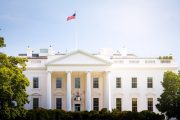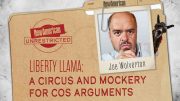
Senate Joint Resolution 19, which has been cosponsored by 43 senators, proposes an amendment to the Constitution “relating to contributions and expenditures intended to affect elections.” On May 14, Senate Majority Leader Harry Reid (D-Nev.; shown) threw his weight behind the resolution, saying: “We’re going to push a constitutional amendment so we can limit spending because what is going on today is awful.”
However, the resolution is not the only threat to the freedom of speech necessary to support our traditional electoral process. A number of organizations, including Call a Convention and Wolf-PAC., are working to convince state legislators to apply for an Article V constitutional convention. Among the amendments such groups seek to propose is one that would “end corporate personhood and publicly finance all elections in our country.” The goals of these organizations dovetail neatly with the objective of S .J. Res. 19, as both the resolution and the Article V groups seek to amend the Constitution to negate the Supreme Court’s Citizens United decision, which ruled that the First Amendment prohibits the federal government from restricting political campaign financing by corporations, associations, and interest groups.
In that May interview, Reid revealed what motivated him to get so strongly behind the resolution, introduced in the Senate by Sen. Tom Udall (D-N.M.) and in the House by Rep. James McGovern (D-Mass.) The Nevada senator had become disenchanted with the electoral process. In 1998, Reid barely won reelection (428 votes) in a race against Republican Rep. John Ensign and blamed “corporate money” spent on the campaign for the closeness of the vote, after he had easily won reelection in 1992.
The 1998 Nevada Senate election is a perfect example of an electoral principle: The lack of restrictions on campaign spending tends to work in favor of challengers and against incumbents. It is little wonder that Floyd Abrams, a renowned constitutional law attorney who has argued many First Amendment cases before the Supreme Court, noted in a statement before the Senate Judiciary Committee hearing regarding S. J. Res. 19 on June 3:
There is another pervasive problem with the proposed amendment. S. J. 19 is rooted in the disturbing concept that those who hold office in both federal and state legislatures, armed with all the advantages of incumbency, may effectively prevent their opponents from becoming known to the public, by adopting legislation, which the proposed amendment would empower them to do, limiting the total amounts they may raise and spend in an effort to do so. Put another way, the amendment will create countless David versus Goliath bouts, with Goliath allowed to make up the rules of the game as it goes along.
During his testimony, Abrams quoted a statement from Justice Antonin Scalia, who observed:
As everyone knows … evenhandedness is not fairness. If all electioneering were evenhandedly prohibited, incumbents would have an enormous advantage. Likewise, if incumbents and challengers are limited to the same quantity of electioneering, incumbents are favored. In other words, any restriction upon a type of campaign speech that is equally available to challengers and incumbents tends to favor incumbents.”
After his close call, Reid joyfully recalled that things had changed for the good, at least for his good, by 2004: “I felt so clean and pure with McCain-Feingold, which had come into being, it was wonderful. We were back where we should have been,” he said. With the new campaign finance restrictions in place, Reid won reelection with 61 percent of the vote.
McCain-Feingold (the Bipartisan Campaign Reform Act of 2002, which won eventual passage as the House version, Shays-Meehan) placed stringent restrictions on campaign contributions by interest groups and other organizations.
Reid showed his hand openly when he bemoaned the Supreme Court’s 2010 Citizens United v. Federal Election Commission ruling, which held that the First Amendment prohibits the federal government from restricting political independent expenditures by corporations, associations, and labor unions. Justice Kennedy stated in the majority opinion: The majority wrote, “If the First Amendment has any force, it prohibits Congress from fining or jailing citizens, or associations of citizens, for simply engaging in political speech.”
Reid revealed his reaction to the freedom that Citizens United restored to organizations to donate to campaigns: “It was as if I had jumped into the sewer … it’s awful what has happened.”
Reid said that he at first hesitated to support Udall’s resolution but was influenced to do so. “[Former Supreme Court] Justice Stevens gave me the nudge that I needed and that is, ‘Let’s try and pass a constitutional amendment,’” Reid said in his interview.
He continued:
It’s been tried before; we should continue to push this [constitutional amendment] and it should become our issue. That really puts the Koch brothers up against it. We believe and I believe that there should be spending limits.
We’re going to arrange a vote on it. We’re going to do it until we pass it because that’s the salvation of our country.
Or, at least, the political salvation of congressional incumbents.
What makes S. J. Res. 19 more dangerous to free speech than previous measures (such as McCain-Feingold) which were implemented though the legislative route, is that it seeks to accomplish its restrictions by means of a constitutional amendment. While the Supreme Court in Citizens United was able to undo the damage done by McCain-Feingold, the High Court would find it impossible to rule that a constitutional amendment is unconstitutional — the only restrictions placed on amendments in the Constitution being that no state can be denied equal representation in the Senate.
But the danger does not end there. From a practical standpoint, Reid can push all he wants to ram S. J. Res. 19 through the Senate, but getting it through the Republican-controlled House would be a great challenge. While S. J. Res. 19 has 43 cosponsors in a 100-member Senate, its companion resolution, H. J. Res. 20, has just 36 cosponsors in the 435-member House.
With the proponents of an amendment to the Constitution to restrict campaign contributions and expenditures facing an insurmountable roadblock in Congress, they are likely to turn to “Plan B.” Article V of the Constitution provides two methods for proposing amendments, the first being the only method used during our nation’s history — by a two-thirds vote of both houses of Congress. Failing to achieve that, the campaign finance limitation amendment’s backers may very well turn to the other method allowed under Article V — a convention for proposing amendments, which shall be called upon application of the legislatures of three fourths of the states.
Arthur R. Thompson, CEO of The John Birch Society, affirmed that the Con-Con proponents are likely to use “Plan B”:
The idea that the leader of the Democrats in the Senate would propose a change to the First Amendment should be an alarm to all constitutionalists and libertarians. Regardless of how he says that they should proceed for such an Amendment, the likelihood of it getting done under the current conditions in the House of Representatives is unlikely, or through the state legislatures either.
That leaves only one recourse, the use of a Con-Con.
Given that the Con-Con movement is basically led by “liberals” who want the corporate world limited in what it can do in elections, there seems little doubt that Reid’s proposal is just another public relations shot to build support for what has become recognized as the Wolf-Pac initiative.
During recent decades, the idea of holding an “Article V convention” has gained support among people across the political spectrum, including those who consider themselves to be “conservatives.” Many of these convention advocates, justifiably frightened by big government and a Congress that has overspent to the tune of a $17.5 trillion national debt, believe that adding a balanced budget amendment to the Constitution would restrain federal spending and prevent budget deficits. Having lost confidence in the willingness of Congress to balance the budget and reduce the national debt, advocates for a balanced budget amendment (BBA) have turned to the Article V convention process in the hopes of drafting a BBA.
What such fiscal conservatives fail to realize, however, is that once Congress convenes a convention, no predetermined rules or limitations, adopted by either Congress or by the states applying for the convention, will have the authority to limit what the convention delegates may choose to do or propose.
A state might, for example, submit an application stating that it wants Congress to call a convention to propose a balanced budget amendment, but the convention might propose a limitless number of amendments on other topics. Since many of the delegates would undoubtedly be of the “progressive” persuasion, some of these proposed amendments might seek to undermine the republican, federal structure of our government and replace it with a European-style parliamentary democracy.
Going beyond the misguided attempts to call for a convention to draft a balanced budget amendment, however, is an even more troubling movement. As Christian Gomez noted in the article post by The New American on May 29, “Working Together to Rewrite the Constitution,” an organization named Call a Convention has been working since 2013 to advance “non-partisan collaboration with other Article V and Amendments groups.” Under the headline “The Article V Movement — Right and Left Working Together for Real Reform” on the organization’s webpage is the group’s effective mission statement: “We are organizations and individuals from both the right and the left who recognize that Washington is broken and will not reform itself…. [We] must call a Convention, and move forward on our common ground for the good of the nation.”
With multiple groups of varying philosophies working together to call an Article V convention, the inevitable result would be a convention that considers multiple amendments. This could only results in a wholesale revision of our Constitution with potentially disastrous consequences.
Listed along with several fiscally conservative “Article V Movement” groups — such as the Convention of States (COS) of Mark Meckler and Michael Farris, the Article V Caucus (of state legislators), the American Legislative Exchange Council (ALEC), the Balanced Budget Amendment Task Force, and the Compact for America — are others known for their progressive liberal positions. These include Convention USA, Amend America, ArticleV.org (“the Inter-Occupy Article V Work Group”), Call a Convention, and Wolf-PAC. The latter deserves further discussion, since, as we noted previously, its goals dovetail with the objective of S. J. Res. 19.
In November 2011, Cenk Uygur, the host and producer of The Young Turks, founded Wolf-PAC with the stated goal to “restore true, representative democracy [sic] in the United States by pressuring our State Representatives to pass a much needed 28th Amendment to our Constitution which would end corporate personhood and publicly finance all elections in our country.” Its slogan is “A super-PAC to end all super-PACs.”
As was Harry Reid, Uygur — whose inspiration to fund Wolf-PAC came from observing the Occupy Wall Street movement — was disenchanted by the Citizens United decision and sought to reverse what the Supreme Court had decided through the amendment process.
Since Wolf-PAC’s creation, Uygur and Call a Convention founder and law professor Lawrence Lessig have traveled the country making joint appearances in which they have encouraged people, including state legislators, to support and pass Article V applications for a convention to propose what they call the “28th Amendment.” Fourteen state legislatures have introduced Wolf-PAC resolutions, with Vermont becoming the first state to approve a Wolf-PAC resolution in May.
Information found on Wolf-PAC’s website confirms that they — like Harry Reid — were motivated by the Citizens United decision to try an end-run around the Supreme Court. They wrote:
Wolf PAC believes that we can no longer count on our Federal Government to do what is in the best interest of the American people due to the unfettered amount of money they receive from outside organizations to fund their campaigns. We point to the failure of the Disclose Act as rock solid evidence that this would be a total waste of our time, effort, and money. We also point to the recent decision by the US Supreme Court to not even hear a case claiming it did not have to abide by Citizens United, as proof that state legislation is not a sufficient measure to solve this problem.
Wolf-PAC provides some history by noting that the closest the United States ever came to calling an Article V convention was in 1913, when the movement to call a convention for the purpose of drafting an amendment to provide for the direct election of senators came within one state of reaching the necessary two-thirds of the states needed force a convention. Wolf-PAC notes: “When it became clear to Congress that the 17th Amendment was going to happen one way or another they decided to preempt a convention by passing it themselves.”
The fact that Wolf-PAC leaders obviously want their supporters to remember that history can only mean that one of its tactics is to bully Congress into passing legislation to propose an amendment (as S. J. Res. 19 does) that is compatible with their goals. They could find no better ally in Congress than Harry Reid.
Constitutionalists have defeated several movements that have attempted to call an Article V convention in recent decades. This flurry of activity from both the Left and the Right to call for a convention only serves to emphasize that eternal vigilance is the price of liberty, of which our Constitution is our primary guardian.
Photo of Sen. Harry Reid: AP Images
Related articles:
Reid Pushes Senate Resolution That Would Abridge Free Speech
Working Together to Rewrite the Constitution
Socialists and Soros Fight for Article V Convention
Michigan State and Local Govts Propose NDAA Nullifying Bills
Article V: Con-Con or Nothing Is the Cry of This Cause Célèbre
Article V Group Ignores States’ Complicity in Federal Power Grab
Article V Convention: Dangerous Precedent, Dangerous Loyalties
Convention of States and Article V: Tearing Up the Talking Points
Compact for America Proposal Could Increase Federal Power
Convention of the States: Wrong on History, Nullification
Convention of the States: Scholars Ignore History
Repair vs. Restore: Why Constitution Doesn’t Need Article V Fix
In Defense of Con-Con, Meckler Chooses Ridicule Over Rebuttal





